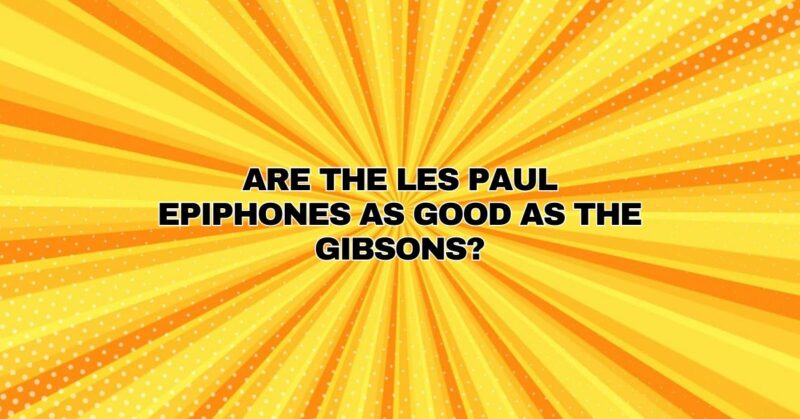The Les Paul guitar is an iconic instrument that has captivated musicians for generations. When considering a Les Paul, you might find yourself faced with a choice between Epiphone and Gibson, two brands that offer their own versions of this legendary guitar. While both Epiphone and Gibson Les Pauls share a similar design and heritage, they cater to different markets and budgets. In this comprehensive article, we’ll explore the distinctions and commonalities between Epiphone and Gibson Les Pauls, helping you make an informed decision based on your preferences, needs, and budget.
1. The Origins: Gibson vs. Epiphone
Gibson:
- Gibson is the original creator of the Les Paul guitar, introducing it in the early 1950s in collaboration with legendary guitarist Les Paul himself.
- Gibson Les Pauls are crafted in the United States, primarily in the Gibson factory in Nashville, Tennessee.
- These guitars are known for their meticulous craftsmanship, premium materials, and hand-finished details.
- Gibson Les Pauls tend to have a higher price point, reflecting their prestige and the quality of construction.
Epiphone:
- Epiphone is a subsidiary of Gibson, specializing in producing more affordable versions of Gibson guitars, including the Les Paul.
- Epiphone Les Pauls are manufactured in various locations, including the United States, China, and Indonesia.
- Epiphone Les Pauls aim to provide an accessible entry point for players who appreciate the Les Paul design and sound but have budget constraints.
- Epiphone Les Pauls offer solid build quality and a range of models to suit different needs and budgets.
2. Craftsmanship and Materials
Gibson:
- Gibson Les Pauls are renowned for their premium craftsmanship and materials. They often feature high-quality tonewoods, such as mahogany bodies with carved maple tops.
- Attention to detail is a hallmark of Gibson guitars, with hand-set necks and meticulous finishes.
- Gibson Les Pauls are equipped with Gibson’s own pickups, which are highly regarded for their tonal characteristics and versatility.
Epiphone:
- Epiphone Les Pauls offer respectable craftsmanship, particularly in their higher-end models. While they may not match Gibson’s handcrafted standards, they still provide solid build quality.
- Tonewood choices may vary depending on the model and country of manufacture, with some models featuring mahogany bodies and tops.
- Epiphone Les Pauls often come equipped with Epiphone pickups, which, while capable, may not achieve the same tonal nuances as Gibson pickups.
3. Playability and Sound
Gibson:
- Gibson Les Pauls are celebrated for their exceptional playability and rich, resonant tone.
- The meticulous setup and fretwork on Gibson guitars contribute to their smooth playability, making them favorites among professional musicians.
- Gibson Les Pauls offer a wide range of tonal possibilities, from warm, creamy clean tones to searing, saturated distortion.
Epiphone:
- Epiphone Les Pauls provide a good level of playability, especially in their higher-tier models. However, they may require some setup adjustments out of the box.
- The sound of an Epiphone Les Paul is faithful to the Les Paul tradition, with solid sustain and a balanced tonal character.
- While they offer versatility, the tonal nuances may not match the depth and complexity found in high-end Gibson Les Pauls.
4. Pricing and Accessibility
Gibson:
- Gibson Les Pauls typically come with a premium price tag, placing them in the upper echelon of the guitar market.
- They are favored by professional musicians and serious enthusiasts who prioritize top-tier craftsmanship and tonal excellence.
Epiphone:
- Epiphone Les Pauls are designed to be more budget-friendly, making them accessible to a wider range of players.
- They are often the choice of beginners, intermediate players, and those looking for a Les Paul-style guitar without the investment of a Gibson.
5. The Verdict: Epiphone vs. Gibson Les Paul
In the Epiphone vs. Gibson Les Paul debate, the right choice depends on your individual needs and preferences:
- Choose a Gibson Les Paul if you value the highest level of craftsmanship, tonal complexity, and playability. Gibson Les Pauls are for those who seek the pinnacle of the Les Paul experience and are willing to invest in it.
- Choose an Epiphone Les Paul if you are on a budget, an intermediate player, or a beginner looking for an affordable entry into the Les Paul world. Epiphone Les Pauls offer solid quality and a range of models to suit various budgets.
Ultimately, whether you opt for a Gibson or an Epiphone Les Paul, you’re embracing a legacy of iconic guitar design and sound. Both brands have their merits, and the choice comes down to your musical journey and what Les Paul experience aligns best with your aspirations and budget.


